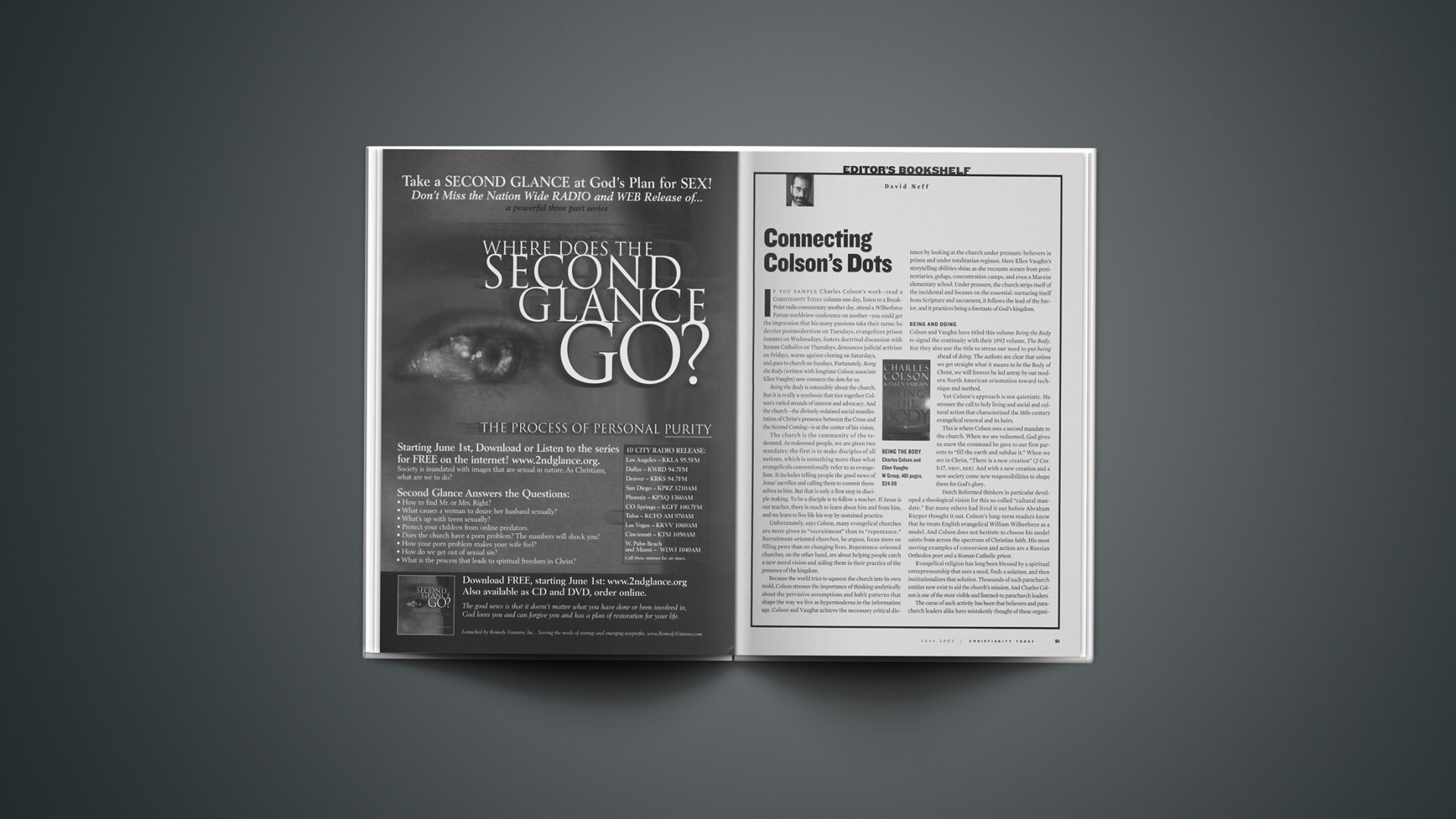If you sample Charles Colson’s work—read a Christianity Today column one day, listen to a BreakPoint radio commentary another day, attend a Wilberforce Forum worldview conference on another—you could get the impression that his many passions take their turns: he decries postmodernism on Tuesdays, evangelizes prison inmates on Wednesdays, fosters doctrinal discussion with Roman Catholics on Thursdays, denounces judicial activism on Fridays, warns against cloning on Saturdays, and goes to church on Sundays. Fortunately, Being the Body (written with longtime Colson associate Ellen Vaughn) now connects the dots for us.
Being the Body is ostensibly about the church. But it is really a synthesis that ties together Colson’s varied strands of interest and advocacy. And the church—the divinely ordained social manifestation of Christ’s presence between the Cross and the Second Coming—is at the center of his vision.
The church is the community of the redeemed. As redeemed people, we are given two mandates: the first is to make disciples of all nations, which is something more than what evangelicals conventionally refer to as evangelism. It includes telling people the good news of Jesus’ sacrifice and calling them to commit themselves to him. But that is only a first step in disciple making. To be a disciple is to follow a teacher. If Jesus is our teacher, there is much to learn about him and from him, and we learn to live life his way by sustained practice.
Unfortunately, says Colson, many evangelical churches are more given to “recruitment” than to “repentance.” Recruitment-oriented churches, he argues, focus more on filling pews than on changing lives. Repentance-oriented churches, on the other hand, are about helping people catch a new moral vision and aiding them in their practice of the presence of the kingdom.
Because the world tries to squeeze the church into its own mold, Colson stresses the importance of thinking analytically about the pervasive assumptions and habit patterns that shape the way we live as hypermoderns in the information age. Colson and Vaughn achieve the necessary critical distance by looking at the church under pressure: believers in prison and under totalitarian regimes. Here Ellen Vaughn’s storytelling abilities shine as she recounts scenes from penitentiaries, gulags, concentration camps, and even a Marxist elementary school. Under pressure, the church strips itself of the incidental and focuses on the essential: nurturing itself from Scripture and sacrament, it follows the lead of the Savior, and it practices being a foretaste of God’s kingdom.
Being and Doing
Colson and Vaughn have titled this volume Being the Body to signal the continuity with their 1992 volume, The Body. But they also use the title to stress our need to put being ahead of doing. The authors are clear that unless we get straight what it means to be the Body of Christ, we will forever be led astray by our modern North American orientation toward technique and method.
Yet Colson’s approach is not quietistic. He stresses the call to holy living and social and cultural action that characterized the 18th-century evangelical renewal and its heirs.
This is where Colson sees a second mandate to the church. When we are redeemed, God gives us anew the command he gave to our first parents to “fill the earth and subdue it.” When we are in Christ, “There is a new creation” (2 Cor. 5:17, NRSV, REB). And with a new creation and a new society come new responsibilities to shape them for God’s glory.
Dutch Reformed thinkers in particular developed a theological vision for this so-called “cultural mandate.” But many others had lived it out before Abraham Kuyper thought it out. Colson’s long-term readers know that he treats English evangelical William Wilberforce as a model. And Colson does not hesitate to choose his model saints from across the spectrum of Christian faith. His most moving examples of conversion and action are a Russian Orthodox poet and a Roman Catholic priest.
Evangelical religion has long been blessed by a spiritual entrepreneurship that sees a need, finds a solution, and then institutionalizes that solution. Thousands of such parachurch entities now exist to aid the church’s mission. And Charles Colson is one of the most visible and listened-to parachurch leaders.
The curse of such activity has been that believers and parachurch leaders alike have mistakenly thought of these organizations as the arena where the real ministry takes place. Colson calls us to focus on the church as the primary arena for Christian life and ministry—and as a word from a paragon of parachurch leadership, it should be heeded.
•••
Next month: Can Christian politics escape ideology?
Copyright © 2003 Christianity Today. Click for reprint information.
Related Elsewhere
Being the Body by Charles Colson is this month’s selection for the Christianity TodayEditor’s Bookshelf. Other sites of interest include:
Read our extended interview with Charles Colson
Buy the book online
Buy other books of Charles Colson
BreakPoint Online offers transcripts, articles, and columns by Colson. Listen to Colson’s daily or archivedBreakpoint broadcasts at oneplace.com.
Charles Colson’s other books include (available on Christianbook.com): How Now Shall We Live?, The Body, Against the Night, Justice that Restores, Science and Evolution, The Christian in Today’s Culture, Why I Believe in Christ, Life Sentence, The Problem of Evil, Loving God, and Born Again.
Christianity Today printed a profile of Colson in 2001 called, “The Legacy of Prisoner 23226.” Colson is also a regular columnist for Christianity Today










